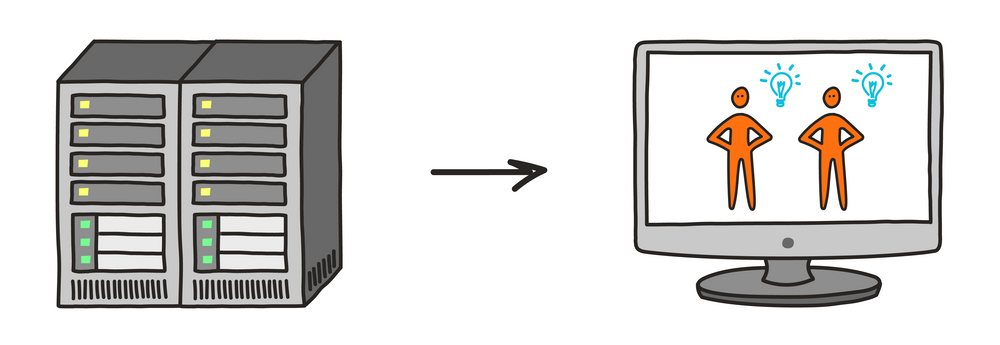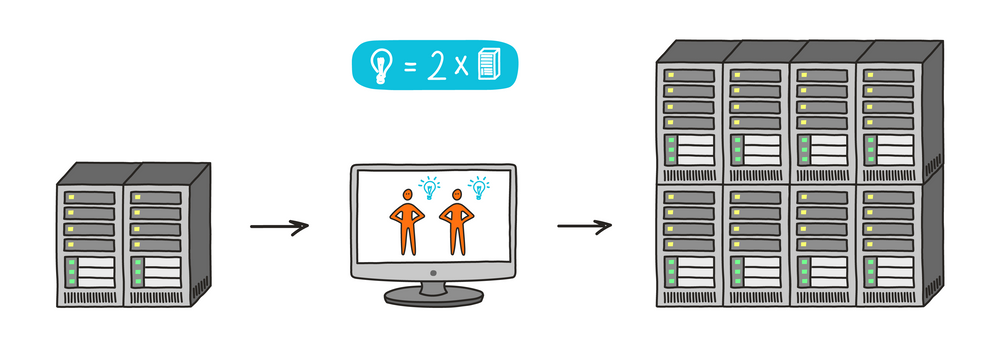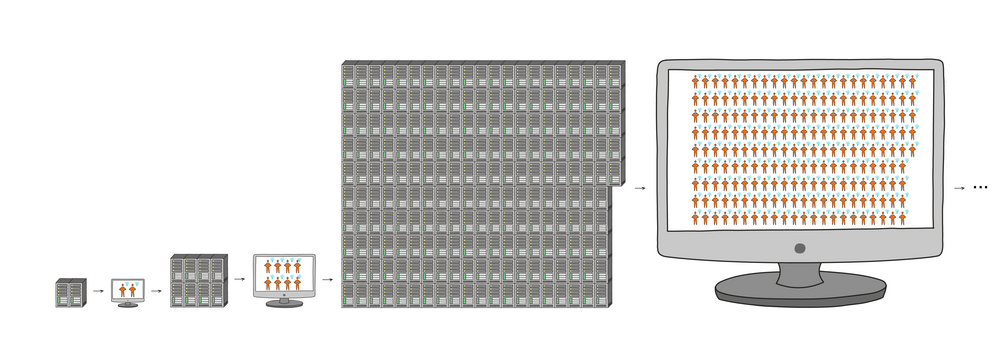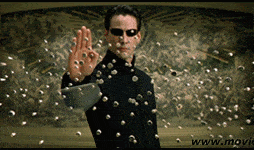Digital People Would Be An Even Bigger Deal (Final Section)
How could digital people change the world?
Productivity
Like any software, digital people could be instantly and accurately copied. The Duplicator argues that the ability to "copy people" could lead to rapidly accelerating economic growth: "Over the last 100 years or so, the economy has doubled in size every few decades. With a Duplicator, it could double in size every year or month, on its way to hitting the limits."



Digital people could create a more dramatic effect than this, because of their ability to be sped up (perhaps by thousands or millions of times)3 as well as slowed down (to save on costs). This could further increase both speed and coordinating ability.4
Another factor that could increase productivity: "Temporary" digital people could complete a task and then retire to a nice virtual life, while running very slowly (and cheaply).5 This could make some digital people comfortable copying themselves for temporary purposes. Digital people could, for example, copy themselves hundreds of times to try different approaches to figuring out a problem or gaining a skill, then keep only the most successful version and make many copies of that version.
It's possible that digital people could be less of an economic force than The Duplicator since digital people would lack human bodies. But this seems likely to be only a minor consideration (details in footnote).6
Social science
Today, we see a lot of impressive innovation and progress in some areas, and relatively little in other areas.
For example, we're constantly able to buy cheaper, faster computers and more realistic video games, but we don't seem to be constantly getting better at making friends, falling in love, or finding happiness.7 We also aren't clearly getting better at things like fighting addiction, and getting ourselves to behave as we (on reflection) want to.
One way of thinking about it is that natural sciences (e.g. physics, chemistry, biology) are advancing much more impressively than social sciences (e.g. economics, psychology, sociology). Or: "We're making great strides in understanding natural laws, not so much in understanding ourselves."
Digital people could change this. It could address what I see as perhaps the fundamental reason social science is so hard to learn from: it's too hard to run true experiments and make clean comparisons.
Today, if we we want to know whether meditation is helpful to people:
- We can compare people who meditate to people who don't, but there will be lots of differences between those people, and we can't isolate the effect of meditation itself. (Researchers try to do so with various statistical techniques, but these raise their own issues.)
- We could also try to run an experiment in which people are randomly assigned to meditate or not. But we need a lot of people to participate, all at the same time and under the same conditions, in the hopes that the differences between meditators and non-meditators will statistically "wash out" and we can pick up the effects of meditation. Today, these kinds of experiments - known as "randomized controlled trials" - are expensive, logistically challenging, time-consuming, and almost always end up with ambiguous and difficult-to-interpret results.
But in a world with digital people:
- Anyone could make a copy of themselves to try out meditation, perhaps even dedicating themselves to it for several years (possibly sped-up).8 If they liked the results, they could then meditate for several years themselves, and ensure that all future copies were made from someone who had reaped the benefits of meditation.
- Social scientists could study people who had tried things like this and look for patterns, which would be much more informative than social science research tends to be now. (They could also run deliberate experiments, recruiting/paying people to make copies of themselves to try different lifestyles, cities, schools, etc. - these could be much smaller, cheaper, and more definitive than today's social science experiments.9)
The ability to run experiments could be good or bad, depending on the robustness and enforcement of scientific ethics. If informed consent weren't sufficiently protected, digital people could open up the potential for an enormous amount of abuse; if it were, it could hopefully primarily enable learning.
Digital people could also enable:
- Overcoming bias. Digital people could make copies of themselves (including temporary, sped-up copies) to consider arguments delivered in different ways, by different people, including with different apparent race and gender, and see whether the copies came to different conclusions. In this way they could explore which cognitive biases - from sexism and racism to wishful thinking and ego - affected their judgments, and work on improving and adapting to these biases. (Even if people weren't excited to do this, they might have to, as others would be able to ask for information on how biased they are and expect to get clear data.)
- Bonanzas of reflection and discussion. Digital people could make copies of themselves (including sped-up, temporary copies) to study and discuss particular philosophy questions, psychology questions, etc. in depth, and then summarize their findings to the original.10 By seeing how different copies with different expertises and life experiences formed different opinions, they could have much more thoughtful, informed answers than I do to questions like "What do I want in life?", "Why do I want it?", "How can I be a person I'm proud of being?", etc.
Virtual reality and control of the environment
As stated above, digital people could live in "virtual environments." In order to design a virtual environment, programmers would systematically generate the right sort of light signals, sound signals, etc. to send to a digital person as if they were "really there."
One could say the historical role of science and technology is to give people more control over their environment. And one could think of digital people almost as the logical endpoint of this: digital people would experience whatever world they (or the controller of their virtual environment) wanted.
This could be a very bad or good thing:
 Bad thing. Someone who controlled a digital person's virtual environment could have almost unlimited control over them.
Bad thing. Someone who controlled a digital person's virtual environment could have almost unlimited control over them.
- For this reason, it would be important for a world of digital people to include effective enforcement of basic human rights for all digital people. (More on this idea in the FAQ.)
- A world of digital people could very quickly get dystopian if digital people didn't have human rights protections. For example, imagine if the rule were "Whoever owns a server can run whatever they want on it, including digital copies of anyone." Then people might make "digital copies" of themselves that they ran experiments on, forced to do work, and even open-sourced, so that anyone running a server could make and abuse copies. This very short story (recommended, but chilling) gives a flavor for what that might be like.
 Good thing. On the other hand, if a digital person were in control of their own environment (or someone else was and looked out for them), they could be free from any experiences they wanted to be free from, including hunger, violence, disease, other forms of ill health, and debilitating pain of any kind. Broadly, they could be "free from material need" - other than the need for computing resources to be run at all.
Good thing. On the other hand, if a digital person were in control of their own environment (or someone else was and looked out for them), they could be free from any experiences they wanted to be free from, including hunger, violence, disease, other forms of ill health, and debilitating pain of any kind. Broadly, they could be "free from material need" - other than the need for computing resources to be run at all.
- This is a big change from today's world. Today, if you get cancer, you're going to suffer pain and debilitation even if everyone in the world would prefer that you didn't. Digital people need not experience having cancer if they and others don't want this to happen.
- In particular, physical coercion within a virtual environment could be made impossible (it could simply be impossible to transmit signals to another digital person corresponding to e.g. being punched or shot).
- Digital people might also have the ability to experience a lot of things we can't experience now - inhabiting another person's body, going to outer space, being in a "dangerous" situation without actually being in danger, eating without worrying about health consequences, changing from one apparent race or gender to another, etc.
Space expansion
If digital people underwent an explosion of economic growth as discussed above, this could come with an explosion in the population of digital people (for reasons discussed in The Duplicator).
It might reach the point where they needed to build spaceships and leave the solar system in order to get enough energy, metal, etc. to build more computers and enable more lives to exist.
Settling space could be much easier for digital people than for biological humans. They could exist anywhere one could run computers, and the basic ingredients needed to do that - raw materials, energy, and "real estate"11 - are all super-abundant throughout our galaxy, not just on Earth. Because of this, the population of digital people could end up becoming staggeringly large.12
Lock-in
In today's world, we're used to the idea that the future is unpredictable and uncontrollable. Political regimes, ideologies, and cultures all come and go (and evolve). Some are good, and some are bad, but it generally doesn't seem as though anything will last forever. But communities, cities, and nations of digital people could be much more stable.
First, because digital people need not die or physically age, and their environment need not deteriorate or run out of anything. As long as they could keep their server running, everything in their virtual environment would be physically capable of staying as it is.
Second, because an environment could be designed to enforce stability. For example, imagine that:
- A community of digital people forms its own government (this would require either overpowering or getting consent from their original government).
- The government turns authoritarian and repeals the basic human rights protections discussed in the FAQ.
- The head wants to make sure that they - or perhaps their ideology of choice - stays in power forever.
- They could overhaul the virtual environment that they and all of the other citizens are in (by gaining access to the source code and reprogramming it, or operating robots that physically alter the server), so that certain things about the environment can never be changed - such as who's in power. If such a thing were about to change, the virtual environment could simply prohibit the action or reset to an earlier state.
- It would still be possible to change the virtual environment from outside - e.g., to physically destroy, hack or otherwise alter the server running it. But if this were taking place after a long period of population growth and space colonization, then the server might be way out in outer space, light-years from anyone who'd be interested in doing such a thing.
Alternatively, "digital correction" could be a force for good if used wisely enough. It could be used to ensure that no dictator ever gains power, or that certain basic human rights are always protected. If a civilization became "mature" enough - e.g., fair, equitable and prosperous, with a commitment to freedom and self-determination and a universally thriving population - it could keep these properties for a very long time.
I'm not aware of many in-depth analyses of the "lock-in" idea, but I elaborate further on this idea here. (Additionally, here are some informal notes from physicist Jess Riedel.)
Would these impacts be a good or bad thing?
Throughout this piece, I imagine many readers have been thinking "That sounds terrible! Does the author think it would be good?" Or "That sounds great! Does the author disagree?"
My take on a future with digital people is that it could be very good or very bad, and how it gets set up in the first place could irreversibly determine which.
- Hasty use of lock-in (discussed above) and/or overly quick spreading out through the galaxy (discussed above) could result in a huge world full of digital people (as conscious as we are) that is heavily dysfunctional, dystopian or at least falling short of its potential.
- But acceptably good initial conditions (protecting basic human rights for digital people, at a minimum), plus a lot of patience and accumulation of wisdom and self-awareness we don't have today (perhaps facilitated by better social science), could lead to a large, stable, much better world. It should be possible to eliminate disease, material poverty and non-consensual violence, and create a society much better than today's.
Next in series: This Can't Go On
Footnotes
-
See Age of Em Chapter 6, starting with "Regarding the computation ..." ↩
-
For example, when multiple teams of digital people need to coordinate on a project, they might speed up (or slow down) particular steps and teams in order to make sure that each piece of the project is completed just on time. This would allow more complex, "fragile" plans to work out. (This point is from Age of Em Chapter 17, "Preparation" section.) ↩
-
See Age of Em Chapter 11, "Retirement" section. ↩
-
Without human bodies - and depending on what kinds of robots were available - digital people might not be good substitutes for humans when it comes to jobs that rely heavily on human physical abilities, or jobs that require in-person interaction with biological humans.
However, digital people would likely be able to do everything needed to cause an explosive economic growth, even if they couldn't do everything. In particular, it seems they could do everything needed to increase the supply of computers, and thereby increase the population of digital people.
Creating more computing power requires (a) raw materials - mostly metal; (b) research and development - to design the computers; (c) manufacturing - to carry out the design and turn raw materials into computers; (d) energy. Digital people could potentially make all of these things a great deal cheaper and more plentiful:
- Raw materials. It seems that mining could, in principle, be done entirely with robots. Digital people could design and instruct these robots to extract raw materials as efficiently as possible.
- Research and development. My sense is that this is a major input into the cost of computing today: the work needed to design ever-better microprocessors and other computer parts. Digital people could do this entirely virtually.
- Manufacturing. My sense is that this is the other major input into the cost of computing today. Like mining, it could in principle be done entirely with robots.
- Energy. Solar panels are also subject to (a) better research and development; (b) robot-driven manufacturing. Good enough design and manufacturing of solar panels could lead to radically cheaper and more plentiful energy.
- Space exploration. Raw materials, energy, and "real estate" are all super-abundant outside of Earth. If digital people could design and manufacture spaceships, along with robots that could build solar panels and computer factories, they could take advantage of massive resources compared to what we have on earth. ↩
-
It is debatable whether the world is getting somewhat better at these things, somewhat worse, or neither. But it seems pretty clear that the progress isn't as impressive as in computing. ↩
-
Why would the copy cooperate in the experiment? Perhaps because they simply were on board with the goal (I certainly would cooperate with a copy of myself trying to learn about meditation!). Perhaps because they were paid (in the form of a nice retirement after the experiment). Perhaps because they saw themselves and their copies (and/or original) as the same person (or at least cared a lot about these very similar people). A couple of factors that would facilitate this kind of experimentation: (a) digital people could examine their own state of mind to get a sense of the odds of cooperation (since the copy would have the same state of mind); (b) if only a small number of digital people experimented, large numbers of people could still learn from the results. ↩
-
I'd also expect them to be able to try more radical things. For example, in today's world, it's unlikely that you could run a randomized experiment on what happens if people currently living in New York just decide to move to Chicago. It would be too hard to find people willing to be randomly assigned to stay in New York or move to Chicago. But in a world of digital people, experimenters could pay New Yorkers to make copies of themselves who move to Chicago. And after the experiment, each Chicago copy that wished it had stayed in New York could choose to replace itself with another copy of the New York version. (The latter brings up questions about philosophy of personal identity, but for social science purposes, all that matters is that some people would be happy to participate in experiments due to this option, and everyone could learn from the experiments.) ↩
-
See footnote from the first bullet point on why people's copies might cooperate with them. ↩
-
And air for cooling. ↩
-
See the estimates in Astronomical Waste for a rough sense of how big the numbers can get here (although these estimates are extremely speculative). ↩